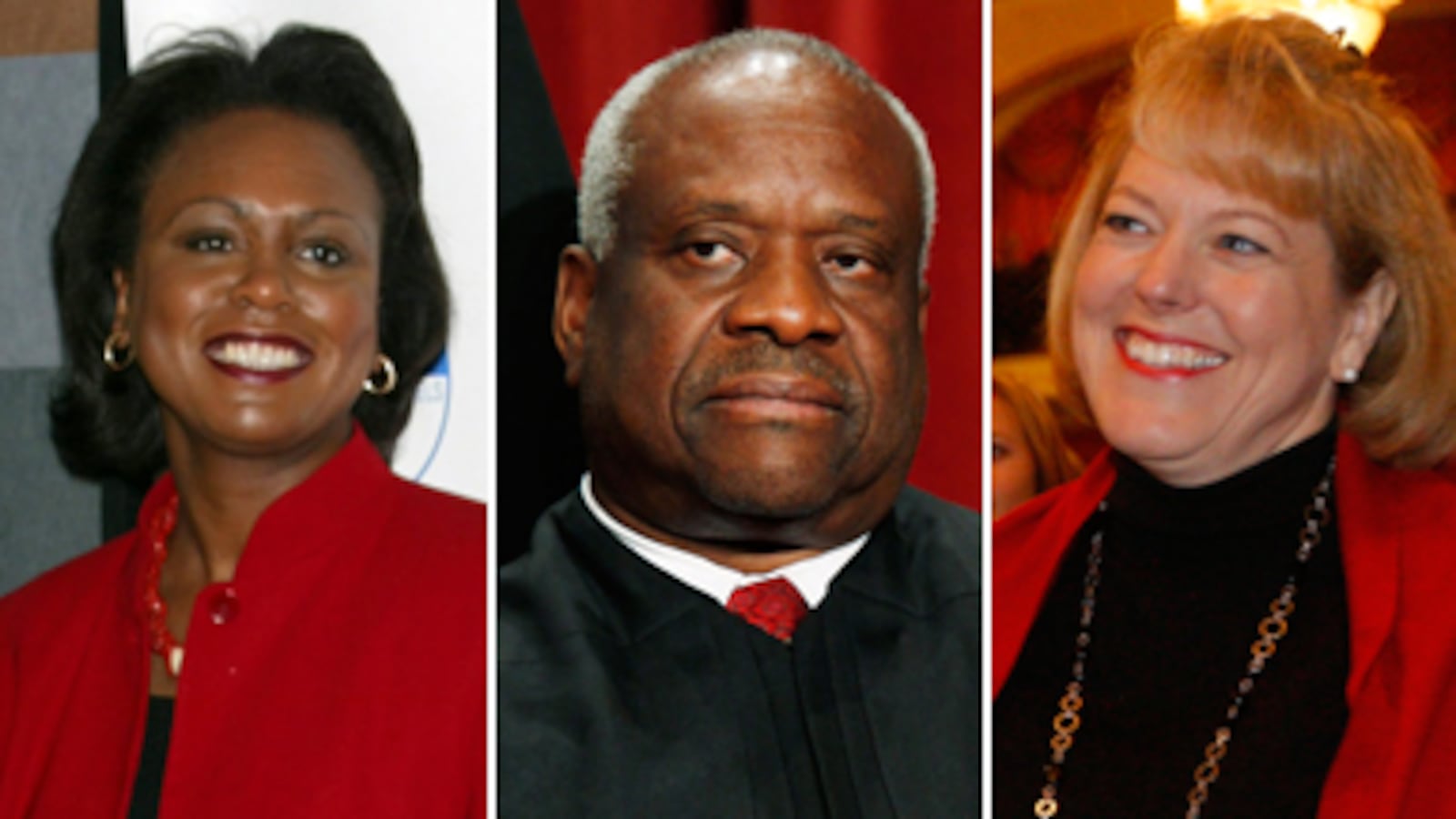When news broke that Clarence Thomas’ wife, Ginni, had left a message for Anita Hill asking her to apologize for accusing the Supreme Court justice of sexual harassment, almost no one could believe it.
The Pulitzer Prize-winning African-American journalist Karen Hunter, appearing on MSNBC, theorized that Ginni was in an Ambien stupor. Gawker wondered if she was drunk.
Even members of Ginni’s family appear to be somewhat perturbed that she chose to raise her husband’s turbulent 1991 confirmation hearing again.
Reached by The Daily Beast on Wednesday afternoon, Ginni’s brother Russell Lamp sounded pretty annoyed that his sister had reopened the wound. “I don’t believe it needs to be in the press in any shape or form,” he said. “It was very difficult for my mother and father who are now passed away, and I’m sorry that Ginni decided to talk more about it.”
Then he hung up.
Ginni’s aunt Betty Jacobs, who found out about the phone call when she saw it on the news, said simply, “I’m confused.”
Then she hung up.
But to others who know Ginni, the more surprising thing may not be that she phoned up Hill but that she took 19 years to do it.
Since Hill shocked the country with claims that Clarence Thomas had repeatedly sexually harassed her—making comments about everything from a pubic hair in a Coke can to Long Dong Silver films—Ginni has held firmly to the belief that Hill was a woman scorned, seeking to ruin her husband.
In an interview with People magazine granted shortly after her husband made it through his famously contentious confirmation hearings, Ginni said, “What [Anita Hill] did was so obviously political…Her allegations…remind me of the movie Fatal Attraction, or in her case, what I call the fatal assistant. In my heart I always believed she was probably someone in love with my husband and never got what she wanted.”

The interview was typical Ginni Lamp Thomas, tough and serious, and emblematic of a certain breed of Republican “Stand by Your Man” women. She and Thomas met in 1986 at an event for the Anti-Defamation League and though they did not share the same skin color or similar upbringing, it was a match made in right-wing heaven.
He was an extraordinarily ambitious black man who believed that affirmative action was bad for African-Americans. She was an extraordinarily ambitious working woman who opposed abortion and bills like the Family Leave Act, which gave women the ability to take time off after giving birth.
“Maybe today she might think better of that outreach, but that phone call strikes me as very Ginni Lamp Thomas. It seems perfectly normal.”
“I think it was love at first sight,” said Hal Daub, the former Nebraska congressman whom Ginni worked for during much of the ’80s. “They were both smart, bright, dedicated, conservative, public policy thinkers, and neither one of them had run into anybody that was so electric and so excited about being in that world.”
Or as Washington attorney Stephen Smith once put it to The Wall Street Journal, “I always joke with people and say if they think Justice Thomas is conservative, they ought to meet Ginni.”
The couple got married in 1987 and set up house in the suburbs of Virginia, where they were known as early risers who liked to run together and pray together at the Truro Episcopal Church, a conservative-leaning place where the majority of worshippers took a “hate the sin, love the sinner” approach to gay rights and the minister was known for delivering sermons about the evils of ending an unwanted pregnancy. “They were a very nice couple,” said Gordon Klooster, who was the business manager at the church throughout the ’90s. “She had more of a background as an Episcopalian, he was Catholic, but they were both very committed to the Lord.”
And of course, both were on the rise.
Clarence, who grew up dirt poor in Georgia—abandoned as an infant by his father, stuck in a segregated school until ninth grade—made it to Yale Law School and became the assistant attorney general in Missouri in his mid-20s. From there, he went on to to work as a legislative assistant to Missouri Sen. John Danforth and then the Equal Employment Opportunity Commission, where Hill worked for him.
Ginni, who grew up well-to-do in Nebraska, was active in student government as a teenager, joined the Young Republicans Club, and quickly began working for Daub as a volunteer. After law school, she joined Daub full-time, working as his legislative assistant on issues like health care and Social Security.
From early on, she was guided by the belief in an extremely limited federal government, a principle she took with her when she went to work at the Chamber of Commerce as a labor relations specialist in the late ’80s. (In recent years, Ginni served as an adviser at the Heritage Foundation, a conservative think tank, before going on to found an advocacy group called Liberty Central, which has strong ties to the Tea Party movement.)
In 1990, President George H.W Bush nominated Clarence Thomas for a seat on the D.C. Court of Appeals. Sixteen months later, when the sole African-American justice on the court, Thurgood Marshall, announced he was retiring, Bush nominated the young judge, then 43, to fill the seat.
Even before the Hill controversy, Thomas’ nomination was a source of major debate. Not only was he was relatively inexperienced, but he also was seen by some blacks as a betrayer, both with the policies he supported and his white wife.
Ginni, meanwhile, came with another asterisk. In the early ’80s, she had been involved in Lifespring, a self-help group that drew criticism for having cult-like attributes. Though she left it in 1985 and became a fierce public advocate against cult activities, showing up at rallies for the Cult Awareness Network, her history with the group led some to view her as a bit of a flake.
Speaking to The Washington Post in 1991 Ginni’s former minister Rodney Wilmoth said: “There’s a kind of naivete about her, a kind of innocence you have to be careful with. Ginni is a very, very trusting person—she once invited a homeless man out to lunch with her in a fancy Washington restaurant...I’m sure that’s one of the reasons she was very susceptible to this group. She was looking for spiritual growth and trusted those people would do the right thing.”
It was a prescient statement coming just weeks before Clarence was accused of sexual harassment. And it might help to explain why all these years later, she still believes wholeheartedly in her husband and sees nothing wrong with the idea of calling up Anita Hill to ask her why she did what she did. In a statement delivered to media oulets on Tuesday, Ginni said, “I did place a call to Ms. Hill at her office extending an olive branch to her after all these years, in hopes that we could ultimately get past what happened so long ago. That offer still stands. I would be very happy to meet and talk with her if she would be willing to do the same. Certainly no offense was ever intended.” Still, the timing of the phone call did seem strange to some. The morning Ginni “reached across the airwaves,” the Times ran an article about her growing public role at Liberty Central, where she works to oppose the leftist “tyranny” of Obama and leftist Democrats in congress. It raised issues about where “large, unidentified contributions” were coming from and pointed out that it could lead to recusal issues for her husband on the Supreme Court. Was Ginni orchestrating a publicity campaign and using Hill as a ruse to galvanize her own base, some wondered. Moreover, if this was an “olive branch,” as she’d said, why was she asking for an apology from Hill; wasn’t that tantamount to calling Hill a liar? And isn’t this Ginni Thomas the same Ginni Thomas who’s been closely allied to dirty tricksters before, having worked for Dick Armey in the '90s on several of the investigations of the Clinton administration? That she is, but Daub took the phone call to Hill at face value. “She has a very deep faith and she’s deeply in love and committed to her husband,” he said. “I think what was in her heart was an attempt to see if there could be some healing. Maybe today she might think better of that outreach, but that phone call strikes me as very Ginni Lamp Thomas. It seems perfectly normal... She was looking for some sort of catharsis.”
Jacob Bernstein is a senior reporter at The Daily Beast. Previously, he was a features writer at WWD and W Magazine. He has also written for New York magazine, Paper, and The Huffington Post.





